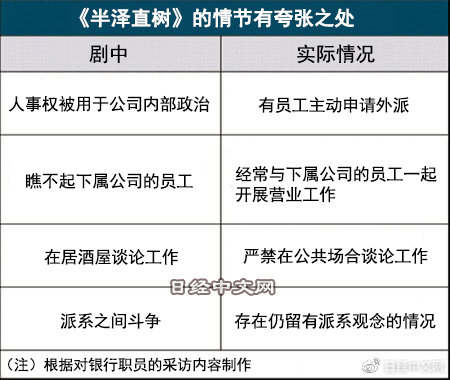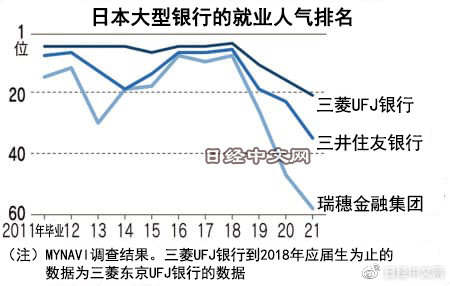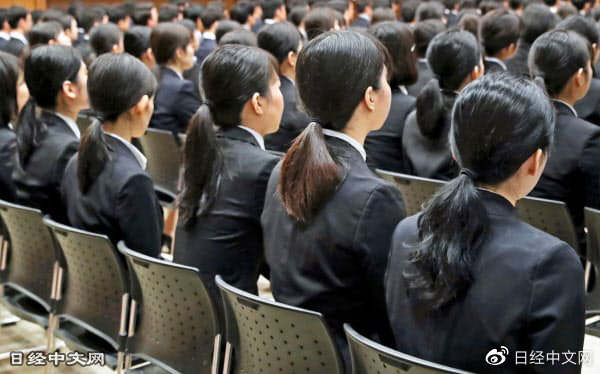In terms of job hunting activities, the banking industry, led by the large banks, can “doubly satisfy” the expectations of young people pursuing an active stage?
Editor’s note: This article is from “Nikkei Chinese Net” author: Zhongjing Cheng Chi, Yosuke Suzuki, authorized reprint.
In the summer of 2020, the TV series “Hansawa Naoki” (season 2) broadcasted by Japanese TV station TBS caused heated discussions.
The protagonist of the play is a bank clerk with a strong sense of justice. He is unyielding in the face of shady power and solved many problems. This attitude makes many viewers feel happy.
At the same time, the play also depicts intricate interpersonal relationships.
“Is it really as described in the play?” It seems that some people look at the bank itself with calm eyes.
In Japan, banks were once a popular employment unit, what is the situation now? The inaugural event interview team of the Nikkei (Chinese version: Nikkei Chinese website) visited this.
“The overall description of this drama is more realistic, but there are also some parts that are not in line with reality.” This year is the fourth year that Hideta Tanaka (pseudonym, 28 years old) has worked in a large bank. He is very concerned about the same bank. The performance of Naoki Hansawa, the staff member, watched all the episodes carefully.
“I order you to work elsewhere!” There are many scenes in the play where executives and other bosses abuse personnel rights and disarm opponents. But Tanaka denied this, saying that in reality “will not abuse power with the backing of personnel rights.” Regarding the expatriation, which is regarded as a synonym for demotion in the play, the actual situation seems to be “in order to accumulate experience in their careers, many people apply themselves.”
In this TV series, bank employees often talk about financing insider and company internal politics in izakayas or high-end Japanese food stores, without any concern for outsiders’ eyes. This situation will not happen in reality. Shohei Hatanaka (a pseudonym, 23 years old), who joined a large bank in the first year, said, “When new employees participate in training, they will first be told not to talk about work in izakayas.”
Faction disputes will affect promotion?
On the other hand, this drama also has many realistic scenes. The bank in the play is named “Tokyo First Bank” (initial letter T) and “”Industry Central Bank” (initial letter S) was formed by the merger of large city banks. They are still divided into “original T” and “original S” factions according to their bank of origin, and fierce struggles have been launched between the factions.
From the actual situation, Japan’s three major banks are all formed by the merger of multiple banks. Hatanaka speculates that “the topic of ‘which bank’s from which bank’s I came from is still frequently raised among high-level executives, and there are still factional concepts”.
In the new employee training attended by Hata, when a director was asked “why he can become a director”, he replied “I don’t know. I think 70% depends on luck.” Hatanaka was skeptical of this statement, saying, “Because the boss of the same faction has become more prominent, so he will follow suit.”
So, what do college students feel after watching this show? A male college student who has been confirmed to be employed by a large bank said with great enthusiasm, “I want to be a bank clerk who implements his concept of justice like Banze.” He is in Student days used to start a business, and went all the way to raise funds. He said that in the process of entrepreneurial enthusiasm, he met people who were helpful to his career. The indomitable Banze was somewhat similar to him at that time.
A early morningPaddy Field The third-year college boy said that he had used the previous season of “Sawa Naoki” and the second season of this year have been watched again, “After watching this drama, I hope to work in a bank. Bank employees need to deal with people from all walks of life and attach importance to relationships with others in their work. Its charm lies”.
However, college students who think this way may only be part of them. Employment information in JapanAccording to a survey conducted by the company MYNAVI on the “Employment Company Popularity Ranking” for college students graduating in 2021, in the liberal arts category, Mitsubishi UFJ Bank is the top-ranked large bank, ranking 21st. Sumitomo Mitsui Banking Corporation ranked 35th, and Mizuho Financial Group ranked 58th. Until a few years ago, these banks had been ranked very high, but now things are different.
Another third-year female student at Waseda University stayed away from large banks. She said, “It may be affected by TV dramas. I feel that large banks manage everything from top to bottom and cannot realize their own ideas.” Due to the declining birthrate and aging population and the long-term low interest rates, the income structure of the Japanese banking industry deteriorated. In order to enhance the attractiveness as an employment unit, large banks must get rid of their inherent image and achieve development.
Encourage “internal sideline business”
Mizuho Financial Group reformed its rigid personnel system. The company formulated its “New Personnel Strategy” in April 2019. It is reported that its characteristic is to configure according to the growth of employees and the work they want to do.
Mizuho Financial Group has launched the “internal sideline business” system. While doing their job well, they can sign up to participate in businesses and projects of interest. Currently, 85 people have signed up. Among them, employees in their twenties account for 36%. This system also provides young people with opportunities to be active. Hideaki Fujii, deputy head of the recruitment team, confidently said “I hope to maximize the value of employees.”
Digitalization such as financial technology is also a major issue facing the banking industry. Sumitomo Mitsui Banking Corporation has set up “digital positions” in comprehensive positions starting with employees who entered the company in 2019. It mainly recruits 5 science graduate students each year. During the six months to three years, they will definitely be assigned to the digital department.
Japanese banks are under pressure from start-ups in the financial technology sector.Nevertheless, Mochida Kyohei, head of the recruitment team of Sumitomo Mitsui Banking Corporation’s personnel department, analyzed that “banks have valuable assets such as information and networks established based on customer trust”.
Mitsubishi UFJ Bank has set up a professional department “Digital Planning Department”. The line stated that “this is a popular department where young people can be active”, and there are also employees in the second to third year of employment in this department.
Beginning in 2019, Mitsubishi UFJ Bank has launched a paid long-term internship that uses artificial intelligence (AI) services and digital technology to plan new businesses as a “digital internship”. It is reported that many students in the recruitment interview also want to enter the digital planning department.
The change in the awareness of job seekers also reflects the status quo of banks in the transition period. The person in charge of recruitment at a large bank stated that “there are very few people who enter the job with the mentality of ‘as long as you enter a large bank, you will be safe’.”
The male employees who entered the first year of a large bank think that “it is very difficult to make money in (Japan)”. In the past, the head of the head office sales was the target for promotion, but “now digital-related departments are very popular.”
Induction ceremony of a large bank (2018)
The world in the TV series is of course fictitious. But banks do leave an impression of being conservative, rigid, and introverted. Changing the state of personnel, bravely challenging new businesses, and breaking the inherent image are also vital to attracting young talents who will take on the future.
Can the banking industry, headed by large banks, “doubly satisfy” the expectations of young people pursuing an active stage in terms of job hunting activities?


